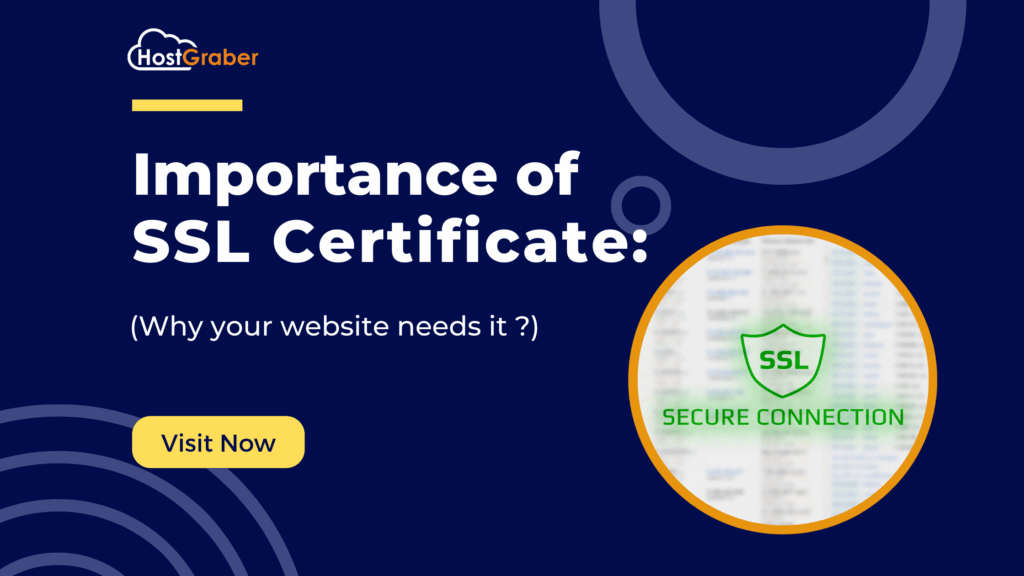The importance of SSL certificate cannot be overstated in today’s digital landscape. Whether you own a personal blog, a business website, or an eCommerce store, ensuring a secure connection for your visitors is essential. An SSL certificate not only protects user data but also boosts trust and search engine rankings, making it a must-have for any website.
What is an SSL Certificate?
SSL (Secure Sockets Layer) is a security protocol that encrypts the connection between a user’s browser and your website server. When your website has an SSL certificate installed, it activates HTTPS (Hypertext Transfer Protocol Secure), ensuring that all data exchanged remains private and protected.
You might have noticed a padlock icon in the address bar of your browser when visiting trusted websites — that’s the SSL certificate in action. It’s more than just a visual indicator; it’s a foundational element of website security.
Why SSL Certificate Matters
1. Data Protection Through Encryption
The core importance of SSL certificate lies in data encryption. When users fill out contact forms, make payments, or log in to your site, their personal information is transmitted over the internet. Without SSL, this data can be intercepted by hackers. SSL ensures that the data is scrambled and unreadable to anyone who tries to access it illegally.
2. Builds Trust and Credibility
Internet users are more cautious than ever. Seeing “HTTPS” and the padlock symbol gives them confidence that your website is safe. This added trust can directly influence conversion rates, as visitors are more likely to make purchases or share personal information on a secure connection.
A website without SSL is flagged by most browsers as “Not Secure,” which can deter potential visitors. When users are greeted with security warnings, they’re likely to abandon the site immediately, increasing bounce rates and harming your brand’s reputation.
3. Better Search Engine Rankings
Another major importance of SSL certificate is its impact on SEO. Google has officially stated that HTTPS is a ranking factor. Websites with SSL certificates are favored in search engine results pages (SERPs) over those without. If you’re aiming for better visibility online, securing your site is a smart move.
Search engines prioritize website security, and having SSL can give you a competitive edge, especially when targeting high-traffic keywords and trying to outrank competitors.
4. Required for PCI Compliance
If your website processes online payments, having an SSL certificate isn’t optional — it’s mandatory. The Payment Card Industry Data Security Standard (PCI DSS) requires SSL to ensure that customer data is transmitted safely. This is another reason the importance of SSL certificate can’t be overstated, especially for eCommerce sites.
Non-compliance can result in hefty fines and damage your business’s credibility. Beyond compliance, customers will appreciate the commitment to data encryption and safety.
Types of SSL Certificates
There are different types of SSL certificates available depending on your business needs:
- Domain Validated (DV) – Basic level, ideal for small websites.
- Organization Validated (OV) – Provides more validation, suitable for small to medium businesses.
- Extended Validation (EV) – Highest level of trust, showing a green address bar with the company name.
Each type offers different levels of authentication, but all provide the basic secure connection you need.
Conclusion
To sum it up, the importance of SSL certificate goes beyond just securing your website. It builds trust, improves SEO, protects sensitive information, and is essential for regulatory compliance. In a time where cyber threats are increasing, having an SSL certificate is not just an option — it’s a necessity.
And here’s the good news — when you purchase hosting from HostGraber, you get a free SSL certificate included with every plan! It’s an easy, cost-effective way to secure your site and boost your online credibility.



